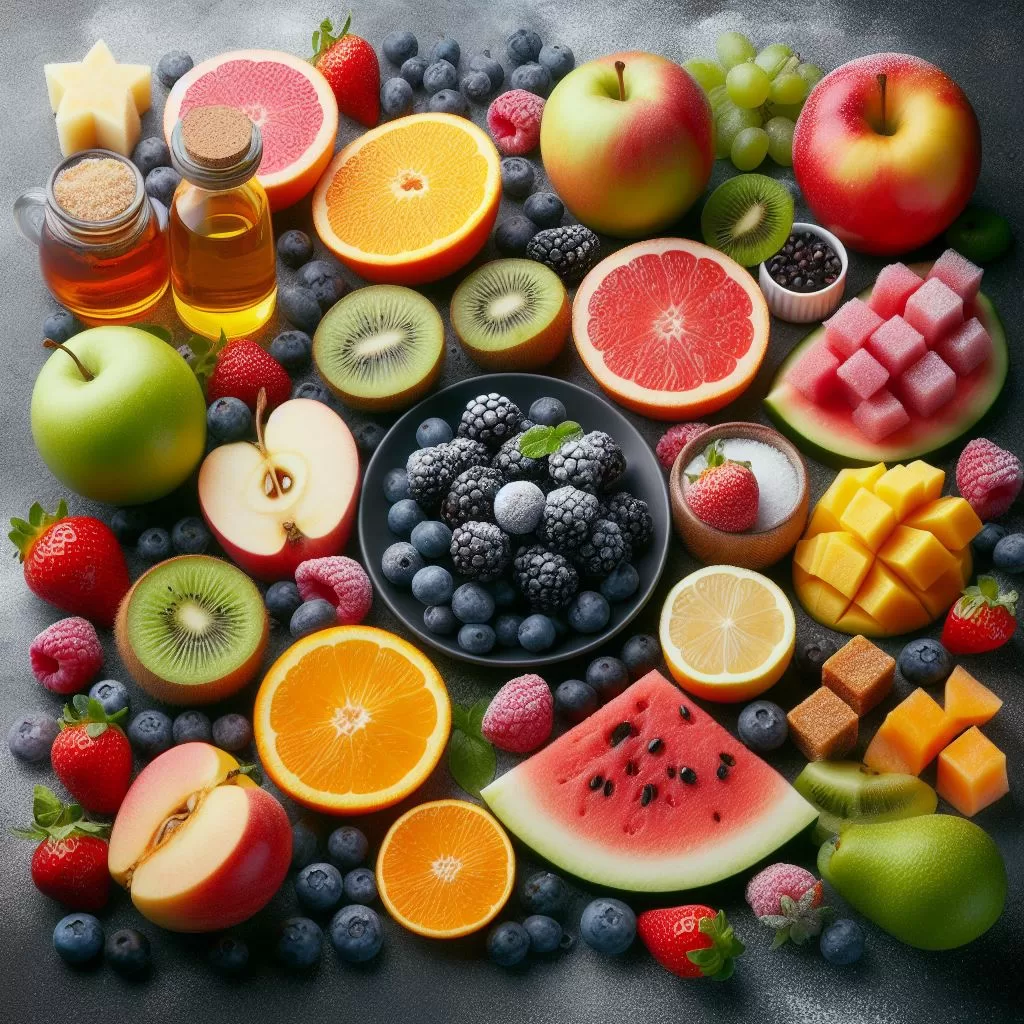In a world where healthy eating is becoming more and more important, certain fruits stand out not only for their exquisite taste but also for their incredible nutritional profile. These superfruits, from avocados packed with healthy fats to antioxidant-packed berries, offer a host of health benefits that can transform your daily diet.
This article delves into the world of these miraculous foods, exploring the nutritional components and benefits of each, to help you make food choices that support your overall well-being.
I. Avocados: A Superfruit Rich in Nutrients and Benefits.

Avocado, often considered a superfood, is a unique fruit. Not only is it low in sugar, with just 0.2g per 100g, but it is also rich in healthy fats and essential nutrients that contribute to a host of health benefits.
1. Nutritional Values of Avocado (per 100g):
– Calories: Approximately 160 kcal
– Fats: Around 15g, the majority of which are monounsaturated fats (good fats).
– Fiber: Approximately 7g, which represents approximately 28% of the recommended daily intake.
– Protein: About 2g
– Vitamins and Minerals:
▪︎Rich in vitamin K, vitamin E, vitamin C, and certain B complex vitamins (B5, B6).
▪︎Contains a significant amount of potassium, higher than that of bananas.
▪︎Source of folate, magnesium, copper, iron, zinc, and certain vitamins A and B2.
2. Benefits of Avocado for Health:
-Cardiovascular Health: The healthy fats present in avocado, especially monounsaturated fatty acids, help reduce the level of LDL cholesterol (bad cholesterol) and increase HDL cholesterol (good cholesterol), thus promoting good cardiovascular health.
-Improved Digestion: Thanks to its high fiber content, avocado helps improve digestion and prevent constipation, contributing to a healthy digestive system.
-Nutrient Absorption: The fats present in avocado facilitate the absorption of fat-soluble nutrients, such as vitamins A, D, E, and K, allowing you to get the most out of the fruits and vegetables consumed with it.
-Anti-inflammatory Properties: Phytochemicals and antioxidants (like vitamin E, vitamin C, and carotenoids) found in avocados have anti-inflammatory properties, which can help reduce inflammation in the body.
-Skin and Eye Health: The antioxidants and vitamins in avocado help protect your skin from free radical damage and maintain eye health with the lutein and zeaxanthin it contains.
-Support for Weight Loss: Although high in fat and calories, avocado can be an excellent ally in a weight loss diet. Fiber and healthy fats can help you feel full longer, reducing the urge to snack between meals.
Avocado is therefore an exceptional choice for those looking to enrich their diet with beneficial nutrients while controlling their sugar intake. By incorporating it into your meals, you not only benefit from a delicious and versatile food but also a real nutritional treasure.
II. Raspberries: A Treasure of Nutrients and Antioxidants.

Raspberries are more than just a delicious fruit; they are a nutritional powerhouse. With only around 4g of sugar per 100g, they offer a wealth of fiber, vitamins, and antioxidants, while being low in calories. Here’s a look at what raspberries can bring to your table.
1. Nutritional Values of Raspberries (per 100g):
– Calories: Approximately 52 kcal
– Sugar: Around 4g
– Fiber: Approximately 6.5g, which represents approximately 26% of the recommended daily intake.
– Protein: Around 1.2g
– Vitamins and Minerals:
▪︎Rich in vitamin C, providing approximately 47% of the recommended daily intake, essential for skin health, wound healing, and iron absorption.
▪︎ Contains good amounts of vitamin K, important for blood clotting and bone health.
▪︎Provide manganese, necessary for the metabolism of amino acids, carbohydrates, and cholesterol.
2. Health Benefits of Raspberries:
-Powerful Antioxidants: Raspberries are loaded with antioxidants like quercetin and ellagic acid, which help fight free radicals in the body, reducing the risk of chronic diseases.
-Digestive Health: Their high fiber content helps maintain digestive health, by promoting regular intestinal transit and preventing constipation.
-Weight Control: Raspberries may play a role in weight management thanks to their low calorie and sugar content, as well as their ability to provide a feeling of fullness.
-Heart Health: Phytochemicals found in raspberries may help reduce blood pressure and improve cardiovascular health.
-Anti-inflammatory Properties: The nutrients in raspberries have anti-inflammatory properties, which can help reduce the risk of chronic inflammatory diseases.
-Strengthening the Immune System: The richness of vitamin C in raspberries contributes to strengthening the immune system, helping to protect the body against various infections.
Raspberries aren’t just a tasty fruit; They are a beneficial addition to any diet, offering an abundance of health benefits while remaining low in sugar. Whether eaten fresh, in smoothies, or as a topping for your desserts, raspberries can enrich your diet deliciously and healthily.
III. Strawberries: Natural Sweetness and Exceptional Source of Vitamin C.

Strawberries are not only loved for their delicious taste and natural sweetness, but they are also a nutritional treasure. With only around 4.9g of sugar per 100g, they offer an abundance of health benefits, thanks to their rich composition of vitamins, minerals, and antioxidants.
1. Nutritional Values of Strawberries (per 100g):
– Calories: Approximately 32 kcal
– Sugar: Around 4.9g
– Fiber: Approximately 2g, contributing to digestive health and the feeling of satiety.
– Protein: Around 0.7g
– Vitamins and Minerals:
▪︎Exceptionally rich in vitamin C, with approximately 58.8 mg per 100g, which represents more than 98% of the recommended daily intake.
▪︎ Contain good amounts of manganese, folate (vitamin B9), and potassium.
▪︎Also provide modest amounts of magnesium, vitamin K, and calcium.
2. Health Benefits of Strawberries:
-Powerful Antioxidant: Strawberries are loaded with antioxidants and phenolic compounds, such as ellagic acid and flavonoids, which help reduce oxidative stress and fight inflammation in the body.
-Strengthening the Immune System: The high vitamin C content of strawberries strengthens the immune system, protecting against various infections and diseases.
-Cardiovascular Health: The antioxidants found in strawberries may help reduce the risk of cardiovascular disease by improving the lipid profile and reducing the oxidation of LDL cholesterol.
-Blood Sugar Regulation: Although sweet, strawberries have a low glycemic index and can help improve blood sugar regulation, which is beneficial for people with diabetes or looking to control their blood sugar levels.
-Skin Health: Vitamin C in strawberries is crucial for the production of collagen, which helps improve the elasticity and resilience of the skin, thereby reducing the effects of aging.
-Cancer Prevention: Certain compounds in strawberries have been linked to a reduced risk of certain types of cancer through their antioxidant and anti-inflammatory properties.
Strawberries aren’t just a treat for the taste buds; they are also a valuable ally for your health. By incorporating them regularly into your diet, you not only enjoy a delicious fruit but also a wide range of nutritional and health benefits.
IV. Blackberries: A Concentrate of Nutrients for Health and Well-being.

Low in sugar and exceptionally nutritious, blackberries are an incredible source of vitamins, minerals, and fiber, making them a great addition to any diet. With around 4.5g of sugar per 100g, they combine delicate flavor and nutritional richness without compromising on health.
1. Nutritional Values of Blackberries (per 100g):
– Calories: Approximately 43 kcal
– Sugar: Around 4.5g
– Fiber: Approximately 5.3g, which promotes healthy digestion and contributes to the feeling of satiety.
– Protein: Approximately 1.4g
– Vitamins and Minerals:
▪︎ Excellent source of vitamin C, providing approximately 35% of the recommended daily intake, essential for the immune system and skin health.
▪︎Rich in vitamin K, important for blood clotting and bone health.
▪︎Contains significant amounts of manganese, a mineral crucial for metabolism and bone health.
▪︎Also provides iron, copper, and magnesium.
2. Health Benefits of Blackberries:
-Powerful Antioxidants: Blackberries are loaded with antioxidants, such as anthocyanin, which help fight free radicals and reduce the risk of chronic diseases.
-Improved Digestive Health: The high fiber content of blackberries helps maintain digestive health, helping prevent constipation and promoting a healthy gut microbiome.
-Immune System Support: Vitamin C in blackberries is essential for the proper functioning of the immune system, helping the body fight infections and disease.
-Cardiovascular Health: The fiber, vitamins, and antioxidants found in blackberries may help reduce the risk of heart disease by lowering blood pressure and improving lipid profile.
-Skin Health: The antioxidant compounds and vitamin C in blackberries play a key role in skin health, helping prevent sun damage and reducing signs of aging.
-Strengthening Bones: Vitamin K and manganese contained in blackberries contribute to the formation of bones and their maintenance in good health, thus reducing the risk of osteoporosis.
Blackberries aren’t just a treat for the taste buds; they are also a valuable ally for your overall health. Their low sugar content and dense nutritional profile make them a great choice for those looking to enjoy the benefits of fruit without the drawbacks of high sugar content.
V. Blueberries: A Superfruit Rich in Antioxidants.

Blueberries are more than just a tasty fruit; they offer an impressive range of health benefits, thanks to their rich nutrient and antioxidant content. With around 10g of sugar per 100g, they are a healthy choice for those looking for both flavor and nutritional value.
1. Nutritional Values of Blueberries (per 100g):
– Calories: Approximately 57 kcal
– Sugar: Around 10g
– Fiber: Approximately 2.4g, helping with digestion and blood sugar regulation.
– Protein: Approximately 0.7g
– Vitamins and Minerals:
▪︎Rich in vitamin C, providing approximately 16% of the recommended daily intake, essential for skin health and the immune system.
▪︎Good source of vitamin K and manganese, important for bone health and metabolism.
▪︎Also contains modest amounts of vitamin E, iron, and magnesium.
2. Health Benefits of Blueberries:
-Powerful Antioxidants: Blueberries are famous for their high antioxidant content, including anthocyanins, which help reduce oxidative stress and fight inflammation in the body.
-Cardiovascular Health: Consumption of blueberries has been linked to reduced blood pressure and improved cholesterol levels, contributing to better heart health.
-Improved Brain Function: Studies suggest that the antioxidants found in blueberries may improve brain function and delay age-related cognitive decline.
-Support Urinary Health: Blueberries are often recommended to prevent urinary tract infections, thanks to their compounds that prevent bacteria from attaching to the walls of the bladder.
-Skin Health: Vitamin C and antioxidants in blueberries help fight skin damage caused by sun, pollution, and aging.
-Diabetes Management: Although they are sweeter than other berries, blueberries have a moderate impact on blood sugar levels, thanks to their fiber and bioactive compound content.
Blueberries aren’t just a delight for the senses; they are also a beneficial addition to any diet, providing a perfect balance of taste pleasure, and health benefits.
VI. Grapefruit: A Low-Sugar Citrus Fruit with Multiple Health Benefits.

Grapefruit is famous not only for its unique taste but also for its impressive nutritional profile. With around 9g of sugar per half grapefruit, it offers the perfect balance for those watching their sugar intake, while still providing an abundance of essential nutrients.
1. Nutritional Values of Grapefruit (per half grapefruit):
– Calories: Approximately 52 kcal
– Sugar: Around 9g
– Fiber: Approximately 2g, contributing to digestive health and a prolonged feeling of satiety.
– Protein: About 1g
– Vitamins and Minerals:
▪︎Rich in vitamin C, providing over 60% of the recommended daily intake, essential for the immune system, tissue repair, and iron absorption.
▪︎Good source of vitamin A, important for vision, immune system, and skin health.
▪︎Contains modest amounts of potassium, necessary for the proper functioning of cells, nerves, and muscles.
2. Health Benefits of Grapefruit:
-Cardiovascular Health: Grapefruit consumption has been linked to reduced cholesterol and blood pressure, contributing to better heart health.
-Antioxidant Properties: Antioxidants found in grapefruit, such as vitamin C and lycopene (in pink and red grapefruit), help fight free radicals, reducing the risk of certain chronic diseases.
-Weight Loss: Grapefruit is often included in weight loss diets, in part due to its fiber content which can help you feel full longer, and its ability to improve metabolism.
-Cancer Prevention: Certain compounds in grapefruit have shown potential in cancer prevention, particularly by inhibiting the growth of cancer cells.
-Skin Health: Thanks to its high vitamin C content, grapefruit contributes to the formation of collagen, thus improving skin health and reducing the effects of aging.
-Hydration: Made up of approximately 90% water, grapefruit is an excellent source of hydration, essential for all bodily functions.
Grapefruit stands out as a healthy choice for anyone looking to reap the benefits of a low-sugar fruit, while still enjoying a wide range of health benefits. Whether eaten fresh, in juice or as part of a fruit salad, grapefruit is a delicious and beneficial addition to your diet.
VII. Kiwis: A Concentrate of Vitamin C, Fiber and Benefits.

Kiwis aren’t just a delicious fruit; they are also exceptionally nutritious. With around 9g of sugar per kiwi, they offer a perfect balance between natural sweetness and richness in essential nutrients.
1. Nutritional Values of Kiwis (per average Kiwi):
– Calories: Approximately 42 kcal
– Sugar: Around 9g
– Fiber: Approximately 2.1g, helping to regulate digestion and contributing to the feeling of satiety.
– Protein: Approximately 0.8g
– Vitamins and Minerals:
▪︎Extremely rich in vitamin C, providing over 230% of the kiwi’s recommended daily intake, which is essential for the immune system, collagen synthesis, and iron absorption.
▪︎Significant source of vitamin K, necessary for blood clotting and maintaining bone health.
▪︎ Contains potassium, important for blood pressure control and muscle function.
▪︎Also offer modest amounts of vitamin E, folate (vitamin B9), and various other minerals such as magnesium and copper.
2. Health Benefits of Kiwis:
-Immune System Support: The high vitamin C content of kiwis strengthens the immune system, helping to prevent infections and illnesses.
-Improved Digestion: The fiber found in kiwifruit promotes healthy digestion and can help prevent constipation.
-Cardiovascular Health: Consumption of kiwis has been associated with improved cardiovascular health, particularly thanks to their ability to reduce blood pressure.
-Blood Sugar Control: Despite their sugar content, kiwis have a low glycemic index and can help regulate blood sugar levels.
-Skin Health: Vitamins C and E in kiwis contribute to skin health, protecting against UV damage and reducing the signs of aging.
-Improved Sleep: Research suggests that consuming kiwis can improve sleep quality, thanks to their serotonin and antioxidant content.
Kiwis offer a perfect blend of flavor, low sugar, and nutritional benefits, making them a valuable addition to any diet. Whether eaten alone, added to fruit salads, or used in smoothies, kiwi is a delicious way to boost your intake of essential nutrients.
VIII. Melons: Hydration and Nutrient Richness for Optimal Health.

Melons, especially cantaloupe, are more than just a source of hydration. With around 8g of sugar per slice, they offer a host of nutritional and health benefits.
1. Nutritional Values of Melons (per average slice of cantaloupe):
– Calories: Approximately 34 kcal
– Sugar: About 8g
– Fiber: Approximately 0.9g, helping with digestion and satiety.
– Protein: Approximately 0.8g
– Vitamins and Minerals:
▪︎Exceptionally rich in vitamin A, providing over 100% of the recommended daily intake per serving, essential for vision, skin, and the immune system.
▪︎ significant source of vitamin C, important for immune health, tissue repair, and iron absorption.
▪︎ Contains potassium, necessary for nerve and muscle function, as well as fluid balance and blood pressure.
▪︎Also offer modest amounts of B vitamins, including folate (vitamin B9), important for the production of healthy cells and the prevention of birth defects.
2. Health Benefits of Melons:
-Hydration: Melons, made up of approximately 90% water, are excellent for staying hydrated, supporting all essential bodily functions.
-Skin Health: Vitamin A and vitamin C in melons contribute to skin health by supporting collagen production and providing protection against sun damage.
-Immune System Support: Nutrients found in melons, such as vitamin C, help strengthen the immune system.
-Disease Prevention: Antioxidants and phytochemicals in melons may help reduce the risk of certain diseases, including heart disease.
-Eye Health: Vitamin A is crucial for eye health, and melons are a rich source of it, helping prevent conditions such as cataracts and age-related macular degeneration.
-Digestion and Weight Loss: Low in calories and high in fiber, melons can help promote healthy digestion and manage weight.
Melons are a delicious and nutritious addition to any diet, offering not only a sweet, refreshing flavor but also a multitude of health benefits. Whether eaten alone, in fruit salads, or as part of a balanced breakfast, they are a great way to enrich your diet.
IX. Peaches: A Natural Sweetness Rich in Vitamins and Benefits.

Peaches are a source of sweet pleasure with only around 8g of sugar per average fruit, offering a healthy alternative to satisfy sweet cravings. In addition to their pleasant taste, peaches are loaded with health-promoting nutrients.
1. Nutritional Values of Peaches (per average fruit):
– Calories: Approximately 58 kcal
– Sugar: About 8g
– Fiber: About 2g, contributing to digestive health and satiety.
– Protein: About 1g
– Vitamins and Minerals:
▪︎Rich in vitamin A, important for vision, skin, and the immune system.
▪︎Excellent source of vitamin C, essential for immune health, tissue repair, and iron absorption.
▪︎Also contain modest amounts of vitamins E and K, potassium, niacin (vitamin B3), and copper.
2. Health Benefits of Peaches:
-Skin Health: Vitamins A and C in peaches help promote healthy skin, supporting cell regeneration and providing protection against UV damage.
-Immune System Support: Vitamin C helps strengthen the immune system, making the body more resistant to infections and diseases.
-Improved Digestion: The fiber found in peaches can help improve digestion and prevent constipation.
-Eye Health: Vitamin A is crucial for eye health, and peaches can help prevent vision problems related to deficiencies.
-Antioxidants: Antioxidant compounds in peaches help fight free radicals, reducing the risk of chronic diseases.
-Hydration: With their high water content, peaches contribute to the hydration of the body, essential for all physiological functions.
Peaches are a great addition to any diet, offering not only succulent flavor but also a wide range of health benefits. They can be enjoyed fresh, in fruit salads, in smoothies, or even toasted for a refreshing summer dessert.
XX. Apples: A Nutritious Classic for a Healthy Diet.

Apples are an excellent choice for anyone looking to incorporate healthy, low-sugar fruits into their diet. With around 10g of sugar per medium apple, they offer more than just a sweet, refreshing flavor.
1. Nutritional Values of Apples (per medium apple):
– Calories: Approximately 95 kcal
– Sugar: Around 10g
– Fiber: Approximately 4g, which represents approximately 16% of the recommended daily intake, contributing to digestive health and blood sugar control.
– Protein: Around 0.5g
– Vitamins and Minerals:
▪︎Source of vitamin C, important for the immune system, wound healing, and iron absorption Contains B vitamins (especially B6), essential for metabolism and brain health. ▪︎Provide potassium, necessary for heart health and electrolyte balance.
▪︎Also offer a small amount of vitamin K, manganese, and copper.
2. Health Benefits of Apples:
-Cardiovascular Health: Soluble fiber in apples, like pectin, may help lower blood cholesterol levels, thereby reducing the risk of heart disease.
-Weight Control: The fiber and water in apples can contribute to feelings of fullness, helping to control weight.
-Digestive Health: The fiber in apples promotes good digestive health and can prevent constipation.
-Reduced Diabetes Risk: Eating apples may be linked to a reduced risk of developing type 2 diabetes, thanks to their fiber content and their effect on blood sugar regulation.
-Protection Against Disease: Antioxidants found in apples, such as quercetin and vitamin C, may play a role in reducing the risk of certain diseases, including certain types of cancers.
-Brain Health: Some studies suggest that compounds found in apples may help protect against Alzheimer’s disease and improve brain function.
Apples are an easy and delicious addition to any diet, providing a variety of health benefits. Whether eaten raw as a snack, added to salads, or cooked in sweet and savory dishes, apples are a great way to increase your fruit intake while enjoying their many nutritional benefits.
Conclusion:
Adopting a diet rich in fruits such as avocados, raspberries, strawberries, and many others is not only a delight for the taste buds, but it is also a step towards better health. Each of these superfruits makes its unique contribution to your well-being, from improving cardiovascular health to preventing chronic disease, supporting the immune system, and promoting glowing skin.
By integrating these low-sugar, nutrient-rich fruits into your diet, you not only optimally nourish your body, but also treat yourself to the pleasure of a varied and tasty diet. Explore the bounty of fruits that nature has to offer and make each bite a step towards thriving health

